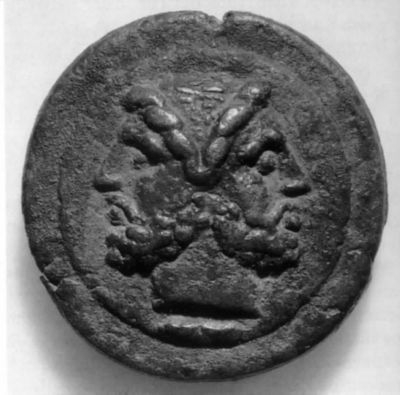Ianus
Home | Latíné | Deutsch | Español | Français | Italiano | Magyar | Português | Română | Русский | English
⚜⚜⚜ Site Index - Key Pages ⚜⚜⚜
Janus is the Roman god of doorways, gates, beginnings and endings, and other such "ways in" and "ways out". As such, he is the first deity invoked in prayer and ritual. The month January, named for Him, is also sacred to Him.
Contents |
History
Father Janus is one of the oldest Roman Gods. He is the God of beginnings, gates and doorways and also is seen in some cases as God of creation. As beginner of all things and all acts he would be offered to first in a ritual that called in a group of deities. Cicero wrote, "In all matters, beginnings and ends are the vital features. This is why they cite Janus first in the sacrifices. (Nat Deor. II 67)" Janus says to Ovid in the Fasti that He is recited first in all prayers so that "through Me, the Doorkeeper, you may attain access to whatever Gods you please (Fasti I.173-4).
Janus has many titles – Geminus (the seminal seed), Patulcius (the opener), Clusius (vault of heaven), Matutinus (the dawning light), Junonius (associated with Juno on the Kalends), and Consivius (the beginner of life).
Father Janus is often shown with two faces, one looking forward – the other backward. Ovid explains Janus' biform is because he is Guardian of every household's front doorway, with one face directed outward that "views the people", and one face that looks inward towards the Lar Familiaris of the family's shrine. Ovid also draws the connection of doorkeeper with the dawning sun, calling Him "the ianitor of the celestial court. (Who) observes the east and the west together (Fasti I. 135-40). When the calendar was changed making January the beginning of the New Year, the month was named for Janus and January 1st was dedicated to him. There is a festival on the Agonalia in January when the Rex Sacrorum would sacrifice a Ram to Janus. There is also the 17th of August where people offer keys to His fire to bless their homes.
The oldest temple in the Forum Holitorium in Rome was the Temple of Janus built in 260 B.C.E. by Gaius Duilius, dedicated on August 17th (the Portunalia). But the most important shrine of Janus in Rome was the Temple of Janus Geminus, which was possibly a double bridge that brought the Sacra Via over the Cloaca to the Comitium. This structure had doors at each end, which could be closed. The temple's foundation is connected with Numa Pompilius and was associated with war and peace in Rome. When Rome was at peace the doors were shut, but when the Romans were at war the doors were left open so Janus could come to their aid if needed because during the war with Titus Tatius a flood of scalding water gushed forth from the temple pushing the enemy back. When the basilica was built in 179 B.C.E. the shrine was moved and apparently rebuilt not as a double bridge, but a smaller structure depicted on the back of some coins of Nero, shown with doors shut signifying peace. In Domitian's time it was moved again to the Forum of Nerva where he replaced the small rectangular structure (ianus) with an image of Janus Quadrifrons (with four faces).
Father Janus is worshipped ritus Romanus and some offerings to him include a ram (on the Agonalia), incense, wine and cakes.
Festivals
The New Year
Cur, quamvis aliorum numina placem,
Iane, tibi primo tura merumque fero?
Ut per me possis aditum, qui limina servo,
Ad quoscumque voles, inquit, habere deos.
At cur laeta tuis dicuntur verba Kalendis,
Et damus alternas accipimusque preces?
Tum deus incumbens baculo, quem dextra gerebat,
Omina principiis, inquit, inesse solent.
Ad primam vocem timidas advertitis aures,
Et primum visam consulit augur avem.
Templa patent auresque deum, nec lingua caducas
Concipit ulla preces, dictaque pondus habent.
- Ovid, Fasti
(Ianus is honored first as we enter the new year. We greet each other with happy words that the new year may begin with good omens.)
Agonalia
The Agonalia, also listed as Agonium, is celebrated at four times during the year, 17 March, 21 May, 11 December, and 9 January. On these days, the rex sacrorum would enter the Forum, and sacrifice a ram to the god. The exact meaning of the ceremony is not known, and even in the time of Ovid the meaning was not known. Just the same, the meaning of the name of the ceremony is also not known, but some have speculated that it comes from a statement of the ritual assistant.
Priests
The rex sacrorum was the only official particularly dedicated to Ianus. There were certainly others who would have been dedicated to Ianus; these would have been temple sacerdotes, as well as other unofficial attendants.
